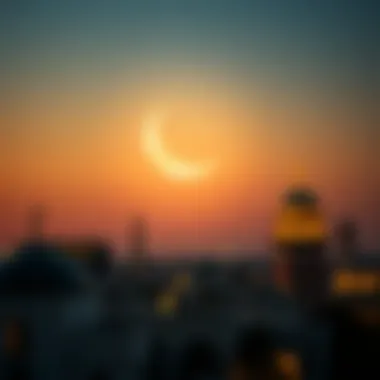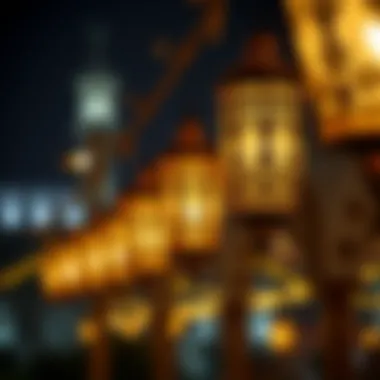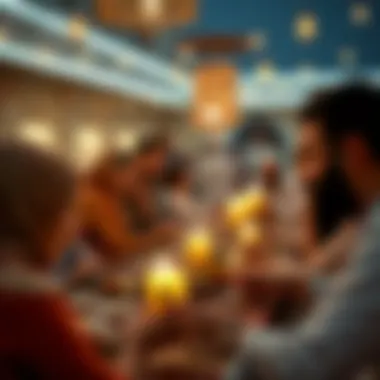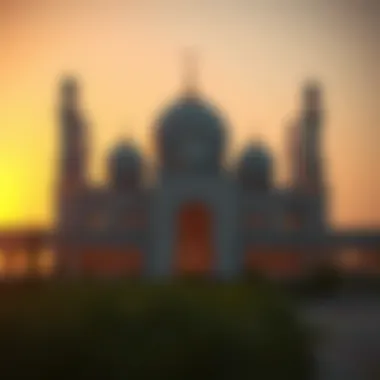Ramadan Timings in the UAE for 2024: A Detailed Overview


Intro
Ramadan stands as one of the most sacred periods in the Islamic calendar, marking a time of prayer, reflection, and community. For many in the UAE, understanding the nuances of Ramadan timing is essential, not only for spiritual purposes but also for navigating the practical aspects of daily life during the holy month. As 2024 approaches, this guide aims to shed light on the specific timings for fasting, prayers, and community gatherings across the UAE, looking at both historical and cultural facets.
The importance of these timings ties back to the lunar calendar, as the sighting of the moon signals the beginning of Ramadan. This article seeks to unravel the traditional customs surrounding the month, the impact of these timings on everyday activities, and the significance they hold within the expansive social fabric of the UAE. For expatriates, understanding this is crucial to engaging meaningfully with their hosts and participating respectfully in community life.
Join us as we explore the intricate dynamics of Ramadan in the UAE for 2024, diving into regional variations, communal traditions, and practical guidance tailored for those engaging with this deeply rooted observance.
Understanding Ramadan
Understanding Ramadan is essential for grasping the cultural and spiritual fabric of the UAE. It is more than just a month of fasting; it embodies deep-seated values and beliefs that resonate through the community. Observing Ramadan is a way for Muslims to strengthen their faith, practice self-discipline, and reflect on their lives. The significance of this holy month is not limited to spiritual elements; it also emphasizes family, community, and social responsibility.
Definition and Importance
Ramadan is the ninth month of the Islamic lunar calendar. During this period, Muslims around the world abstain from food, drink, and other physical needs from dawn to sunset. The fast serves multiple purposes: it fosters a sense of unity among believers, aids in sharpening spiritual focus, and encourages empathy towards the less fortunate.
Consider this: by going without food for a day, a person begins to understand the struggles faced by those in poverty. This shared experience strengthens community connections and encourages charitable actions, such as giving to those in need, which is especially significant in a diverse and bustling place like the UAE.
The religious observance during Ramadan extends beyond individual fasting. It includes increased prayer and Quranic reading, promoting spiritual growth, personal reflection, and a renewed commitment to faith. For expatriates and tourists, understanding Ramadan is not just about observing local traditions; it's about respecting a fundamental aspect of the cultural identity in the UAE.
Historical Context
The historical roots of Ramadan reach deep into Islamic tradition. It commemorates the month when the Quran was revealed to the Prophet Muhammad. This connection infuses the period with profound religious significance. Over the centuries, Ramadan has evolved but remains steadfast in its core principles. In the UAE, various historical practices reflect local customs. Traditionally, nighttime gatherings and special meals, known as Iftar, have been vital for families and communities to come together after a day of fasting.
In recent years, there has been a marked transformation in how Ramadan is observed, particularly in urban settings such as Dubai and Abu Dhabi. Modern conveniences and technological advancements have created a layered experience of the holy month. Nevertheless, the foundational essence of Ramadan—community, reflection, and spirituality—remains. Understanding this blend of tradition and modernity is crucial for anyone wishing to grasp the full impact of Ramadan within the society of the UAE.
The implications of Ramadan extend beyond religious observance; they influence social dynamics and economic activities, shaping lifestyles throughout the country.
"The essence of Ramadan transforms not just individuals, but entire communities, promoting bonds that last a lifetime."
In summary, a comprehensive understanding of Ramadan within the UAE context provides insights into the values and practices that define the region. Whether one is a long-time resident or a newcomer, recognizing the significance and historical context of Ramadan enriches the experience immensely.
Ramadan in the UAE
Ramadan, a month of fasting and reflection, holds a significant place in the cultural and religious landscape of the UAE. This period is not only about abstaining from food and drink but also about fostering community bonds and spiritual growth. In the UAE, where the population is a rich tapestry of different cultures, Ramadan is a time that highlights the shared values of respect, charity, and unity among residents. This article delves into how Ramadan manifests uniquely in the Emirati context, reflecting its importance in both personal and communal aspects.
Cultural Significance
The cultural significance of Ramadan in the UAE can hardly be overstated. It is a time when families come together, and friendships are strengthened through acts of kindness and generosity. During this month, the practice of giving is accentuated; it's not uncommon to see individuals and businesses providing meals to those in need or distributing Iftar packs to support fellow community members.
Ramadan also serves as a reminder of the importance of empathy and compassion. With the heat of the day bearing down, those fasting experience firsthand the difficulties faced by underprivileged individuals daily. This experience fosters a sense of responsibility among Emiratis and expatriates alike, inspiring them to contribute positively towards society.
Traditions, such as community prayers at the mosque and gatherings for breaking the fast, create a communal atmosphere. These practices unite people across different nationalities, promoting a sense of belonging, regardless of one's background. The UAE, renowned for its hospitality and openness, welcomes each person to partake in these unique cultural experiences and immerse themselves in the essence of Ramadan.
Modern Observations


Modern observations of Ramadan in the UAE showcase a blend of traditional values with contemporary lifestyles. In the cities, vibrant Iftar tents spring up, serving not only traditional Emirati dishes but also international cuisines, reflecting the diverse cultural backdrop of the country. Dubai and Abu Dhabi become cultural hubs during this period, where celebrations extend beyond individual households to larger community events, focusing on inclusiveness.
The spirit of Ramadan can also be seen in commercial enterprises, as many businesses adjust their hours to accommodate fasting schedules. Cafés and restaurants may pivot to offer exclusive Iftar menus, providing a unique dining experience for families and groups.
Social media plays a vital role in sharing experiences. Many people share their Iftar preparations, regional recipes, and prayers online, bridging the gap between the local and global communities.
In addition to culinary experiences, people are increasingly seeking educational events and workshops focused on the significance of Ramadan, allowing for a deeper understanding that resonates beyond religious practices.
As the world evolves, so too does the way Ramadan is experienced in the UAE. With an acute focus on social good, environmental sustainability, and interfaith dialogue, the modern interpretation aligns harmoniously with the age-old traditions, ensuring the relevance of Ramadan in today's fast-paced life.
"Ramadan is not just a time to reflect; it is a call to action for compassion and unity across communities"
In essence, the Ramadan experience in the UAE is a dynamic interplay between tradition and modernity, making it a period of both personal significance and communal engagement.
Determining Ramadan Timing
Understanding how Ramadan timing is determined is essential for both Muslims and non-Muslims living in the UAE. It shapes the rhythm of daily life, influencing work hours, community interactions, and cultural practices. This awareness enables residents and expatriates to navigate their schedules around prayer times and fasting requirements, fostering a sense of community and shared experience. The details surrounding Ramadan timing draw from ancient traditions and are influenced by modern advancements, which is what we explore in the following sections.
The Lunar Calendar
The Islamic calendar is a lunar calendar, which means it is based on the phases of the moon rather than the solar cycles that govern the Gregorian calendar. Ramadan begins on the ninth month of the Islamic calendar after moon sighting confirms its arrival. The moon's visibility can vary based on location due to atmospheric conditions and geographical features. As a result, the start of Ramadan may differ slightly between regions, causing some confusion among those not familiar with lunar cycles.
Traditionally, the appearance of the crescent moon has been the signal for the start of Ramadan. This connection to the moon not only serves practical purposes but also evokes spiritual significance, reminding Muslims of the importance of reflection and community.
Moon Sighting Protocols
In the UAE, the moon sighting is generally organized by local mosques, Islamic authorities, or government bodies, who announce the decision based on reports from authorized observers. This practice involves gathering upon the sighting of the new moon, usually on the 29th night of Sha'ban, which is the month preceding Ramadan. If the moon isn't visible, the Islamic tradition dictates that the current month completes its 30 days, and Ramadan begins the following day.
"It's not just about following a timetable; it’s about connecting with one's community and the divine through the shared experience of timing and faith."
This process fosters unity among the Islamic community and underlines the value placed on tradition and communal observance. However, with diverse nationalities residing in the UAE, some communities may rely on the announcements from their respective countries, which could cause varying start dates.
Impact of Technology
Technology has revolutionized how Ramadan timing is determined and observed. While traditional moon sighting holds significant importance, many people now turn to apps and websites that provide detailed prayer times and fasting schedules. These applications utilize astronomical calculations and are often updated in real-time, making it easier for people to plan their daily routines.
Moreover, social media plays a vital role in disseminating information regarding the start of Ramadan and daily updates about fasting times. Communities maintain active discussions on platforms such as Facebook and Reddit, whereby residents share local news or insights on moon sightings.
The blend of tradition and technology ensures that residents, whether expatriates or locals, can align their practices with spiritual commitments while managing life's practicalities. All in all, understanding how Ramadan timing is determined sheds light on its significance in the UAE and the wider Muslim community.
Specifics of Ramadan Timing in
Understanding the specifics of Ramadan timing in 2024 is crucial for both expatriates and citizens in the UAE. This period of fasting brings about not just a spiritual journey but also a time of communal harmony and social change. Knowing when Ramadan begins and how daily fasting hours are set can significantly enhance the experience, allowing individuals to plan their day-to-day activities accordingly. Moreover, being aware of regional variations in Iftar times is vital for gathering with family and friends.
Start Date in the UAE


The start of Ramadan is determined by the sighting of the moon, which varies according to geographical location. In 2024, Ramadan is expected to begin around March 10, but this is tentative and can shift based on the actual moon sighting. In the UAE, local authorities usually announce the date officially, which often involves beautiful prayer services and gatherings at mosques.
To effectively prepare, it's essential to keep an eye on announcements from the UAE's Federal Authority for Government Human Resources or local news outlets.
Daily Fasting Hours
Fasting hours during Ramadan in the UAE vary each day, gradually shifting as the month progresses. Around the start of Ramadan, fasting typically starts at dawn, which is recorded around 4:45 AM, and lasts until sunset, estimated around 6:30 PM. This means that there can be approximately 13 to 14 hours of fasting, depending on the exact times.
The challenge lies in adjusting one's daily routine to accommodate these hours. It’s common for people to wake up before dawn to have a pre-fast meal known as Suhoor. This meal is vital as it provides the necessary energy for a day of fasting.
Iftar Times by Region
In the UAE, Iftar times may differ slightly from one emirate to another. Here’s a brief overview:
- Abu Dhabi: Iftar is usually around 6:30 PM.
- Dubai: Similar to Abu Dhabi, with the sun often setting at 6:29 PM.
- Sharjah: Iftar is typically around 6:28 PM, with variations depending on specific neighborhoods.
Table of Iftar Times:
| Emirate | Iftar Time | | Abu Dhabi | 6:30 PM | | Dubai | 6:29 PM | | Sharjah | 6:28 PM | | Ajman | 6:27 PM | | Ras Al Khaimah| 6:26 PM |
Being aware of these timings allows for better organization of social gatherings and family dinners, vital to the sense of community that Ramadan promotes.
Social Dynamics during Ramadan
Social dynamics during Ramadan bear considerable significance in the context of the UAE. This holy month is more than a period of fasting; it is a time when community bonds deepen, cultures intertwine, and culinary delights flourish. Understanding these dynamics can enhance the experience for both residents and expatriates alike, making their observance of Ramadan more meaningful and aligned with local traditions.
Community Gatherings
One of the most cherished aspects of Ramadan is the emphasis on community gatherings. During this month, people come together for Iftar, the meal that breaks the fast at sunset. Families, friends, and neighbors unite to share food, stories, and laughter. This tradition is not just limited to homes; public Iftar events populate parks, mosques, and community centers across the UAE. These gatherings foster a sense of belonging, particularly for expatriates who might feel disconnected from their home cultures.
Community gatherings also serve to strengthen the social fabric among UAE residents. Here, cultural exchange becomes prevalent. Attendees have an opportunity to sample various local and international dishes, showcasing the UAE’s diverse population. From traditional Emirati dishes like Al Harees to South Asian delights like Samosas, the culinary offerings during these events are as varied as the people enjoying them.
“Sharing a meal is not just about food; it’s about building connections and understanding different perspectives.”
Culinary Traditions
Culinary traditions during Ramadan in the UAE are rich and varied, each dish telling a story. The food prepared during this month is symbolic of hospitality and generosity, reflecting the UAE's cultural heritage. People indulge in both sweet and savory foods that play a significant role in breaking the fast.
Dishes like Shorbat Adas, a lentil soup, are commonly served to nourish the body after a day of fasting. Another favorite is Kunafa, a dessert made from thin noodle pastry soaked in syrup, which adds a sweet touch to the occasion. Unique culinary experiences abound, as restaurants often curate special Ramadan menus, encouraging families to dine out and enjoy the festive spirit.
For many, recipes handed down through generations become focal points of Ramadan tables, creating a nostalgic atmosphere. Food becomes a bridge connecting different cultures, as expatriates bring their own flavors into the mix, creating a rich tapestry of tastes.
Cultural Diversity
The UAE is a melting pot of cultures, particularly evident during Ramadan. People from different nationalities celebrate this holy month in their unique ways, contributing to the richness of the experience. This cultural diversity manifests in various customs, attire, and food traditions observed during Ramadan.


With Ramadan being a religious observance, expatriates may draw from their own cultural practices, integrating them into the local celebration. For instance, South Asian families might initiate their fast with a special prayer followed by a meal of Biryani, while Arab families might emphasize sharing traditional drinks like Qamar al-Din, a nectar made from apricot.
Moreover, events showcasing cultural performances come to the forefront, where traditional music and dance offer a glimpse into different heritages. These events allow UAE residents to appreciate not only their traditions but also those of their neighbors, fostering an environment of mutual respect and understanding.
Practical Considerations for Residents
Understanding the practical considerations for residents during Ramadan is essential. This period is not just about fasting but adapting daily life to honor the significance of the month. Each element contributes to the overall experience of Ramadan, impacting work, movement, and health.
Workplace Adjustments
During Ramadan, many workplaces in the UAE adjust their hours. Most organizations shorten workdays, allowing employees to finish earlier. This adjustment respects the fasting schedule, which typically ends around sunset.
Employees can expect a reduction in hours, often working from 9 a.m. to 3 p.m. instead of the usual timing. Moreover, flexibility may be offered, allowing for staggered hours, which helps accommodate those who prefer to work early or late.
Organizations often create a culture of understanding. With teams made up of various backgrounds, encouraging compassion and patience among colleagues becomes vital. Some companies even provide Iftar meals, promoting camaraderie and shared experiences.
Travel and Transportation Changes
Navigating the UAE during Ramadan can be tricky. Public transport schedules may shift slightly, reflecting the changing routines of the population. For instance, the Roads and Transport Authority in Dubai often extends the Metro operating hours to cater to the late-night crowds, response to an increase in demand for travel from Iftar until the early hours of Suhoor.
Important things to keep in mind:
- Traffic congestion is common around Iftar time due to people rushing home to break their fast.
- Planning travel around these peak hours can reduce frustration.
Additionally, local taxi services sometimes adjust their availability to align with the evening rush. It’s wise to use transport apps to predict wait times and availability accurately. Understanding these changes can make moving around smoother, ensuring less hassle and faster commutes.
Health and Wellbeing Tips
Fasting impacts health, and it’s crucial to take mindful steps during Ramadan. Staying hydrated during non-fasting hours is essential. The recommendation is to drink plenty of water in the hours between Iftar and Suhoor. An effective approach is to consume nutrient-rich foods during these times. Incorporating whole grains, lean proteins, and plenty of fruits and vegetables can provide necessary energy levels throughout the day.
"Breaking the fast gradually is key. It’s advised to start with dates and water, as this helps in easing digestion."
Regular exercise should also be adjusted. Instead of seeking intense workouts, consider lighter activities like walking or yoga during the evening. Listening to one’s body is essential, especially during a month when people are fasting.
This month also brings about a change in routine, which can lead to mood fluctuations due to altered eating and sleeping patterns. Residents should prioritize mental health by practicing mindfulness or meditation. With a bit of planning and consideration, Ramadan can be a month of enhanced wellbeing and communal spirit.
Finale
As we draw our thoughts together, it becomes clear that understanding the timings of Ramadan is not just about counting the hours of fasting. Rather, it enshrines a rich tapestry of traditions, beliefs, and communal bonding that makes the holy month a profound experience for both locals and expatriates in the UAE. The significance of this topic is underscored by its ability to navigate through cultural nuances and practical implications that shape daily life during this auspicious time.
Reflection on Ramadan's Role
Ramadan functions as a cornerstone of spiritual growth and societal cohesion. It calls upon Muslims to engage deeply with their faith through fasting, prayer, and acts of charity. The transformative power of Ramadan extends beyond mere abstention from food; it's a time where self-discipline is tested and community spirit is heightened. The evenings bring people together for Iftar, breaking the fast with family and friends, thus reinforcing bonds that may often fall by the wayside during the bustle of everyday life.
However, the holy month serves a dual purpose. While it is a time for serous reflection and spirituality, it also prompts the UAE's vibrant diversity to showcase its multifaceted culture. Festivals, special events, and culinary experiences take center stage, showcasing not only what it means to observe the Ramadan traditions but also how these customs are interpreted through differing cultural lenses.
In this framework, expatriates becoming part of this rich blend offers a unique opportunity for intercultural dialogue, promoting understanding and respect among varied backgrounds. This mirrors the UAE's wider objectives of coexistence, tolerance, and community building, emphasizing how Ramadan plays a crucial role in furthering these ideals.
Future Observations
Looking ahead, the future of Ramadan observance in the UAE will likely continue evolving, especially as advancements in technology and societal shifts influence practices. While mobile applications and online platforms help in determining fasting hours, the essence of Ramadan—embodying spirituality and community engagement—will remain intact.
As the UAE continues to bloom into a hub of global cultures, we can anticipate an even richer blend of traditions during Ramadan. Local businesses may pivot to cater to the needs of a growing population, bringing forth innovative communal activities that further enhance social cohesion. The continuous dialogue among communities about conserving traditional practices versus embracing modernity will create an ever-changing landscape.















